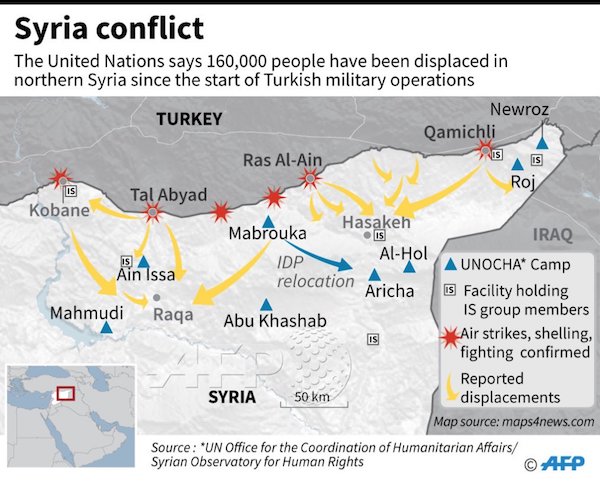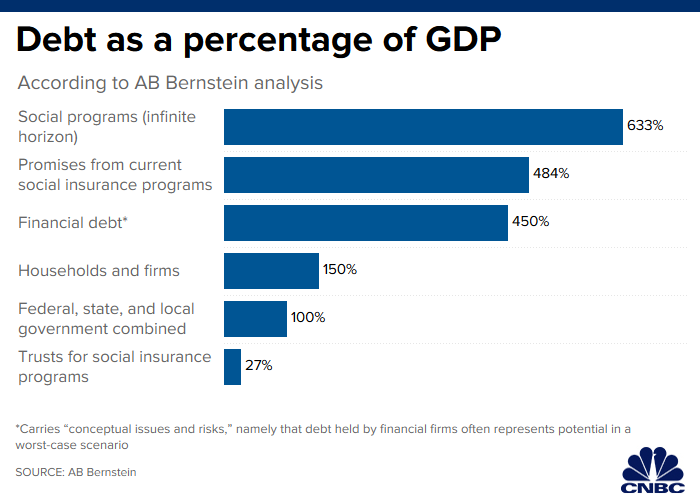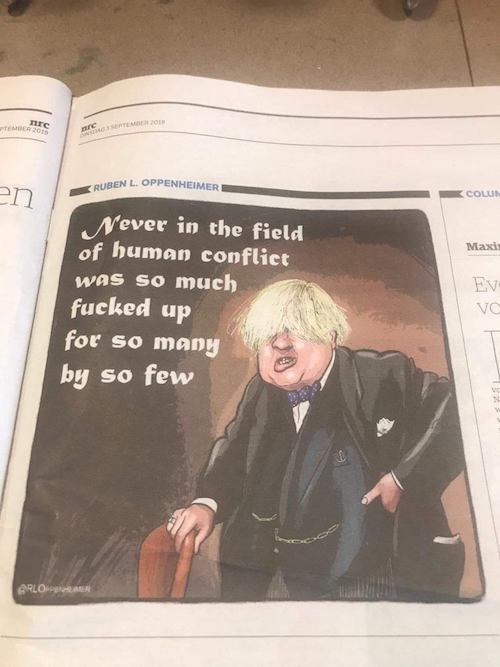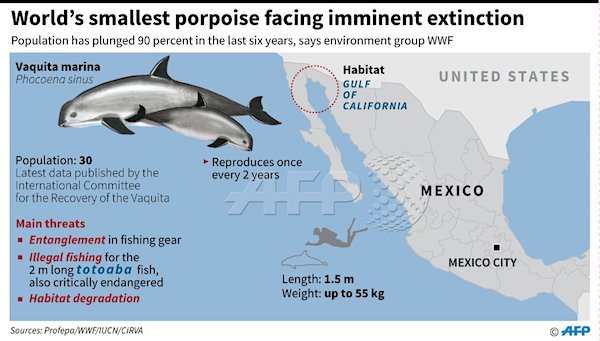
Paul Gauguin A seashore 1887

Did they plan this in advance?
• Trump Tells Turkey To Stop Its Syria Invasion (R.)
U.S. President Donald Trump on Monday demanded Turkey stop its military incursion in Syria and imposed new sanctions on the NATO ally as Trump scrambled to limit the damage from his much-criticized decision to clear U.S. troops from Turkey’s path. Vice President Mike Pence said Trump had told Turkish President Tayyip Erdogan in a phone call on Monday to agree to an immediate ceasefire. He also said he would travel to the region soon to try to mediate the crisis. Pence said Trump had been firm with Erdogan on the phone. “The United States of America simply is not going to tolerate Turkey’s invasion in Syria any further. We are calling on Turkey to stand down, end the violence and come to the negotiating table,” Pence told reporters.
Turkey launched a cross-border operation into northern Syria on Wednesday just days after Erdogan told Trump in a phone call that he planned to move ahead with a long-planned move against America’s Kurdish allies in the region. Trump abruptly announced a redeployment of 50 American troops from the conflict zone to get them out of harm’s way, dismissing criticism that this would leave the Kurds open to attack. This was widely seen as giving Erdogan a green light for his operation. With lawmakers in the U.S. Congress moving to impose sanctions of their own, Trump issued an executive order authorizing sanctions against current and former officials of the Turkish government for contributing to Turkey’s military operation in northern Syria.
In a statement, Trump said he had increased tariffs on imports of Turkish steel back up to 50 percent, six months after they were reduced, and would immediately stop negotiations on what he called a $100 billion trade deal with Turkey. “Unfortunately, Turkey does not appear to be mitigating the humanitarian effects of its invasion,” said Trump.


The New York Times had no credibility left anyway.
• ‘You’ve Been Duped By Spooks & Terrorists’ (RT)
A damning report by the New York Times, which accused Russia of bombing four UN-protected hospitals in Syria, is a product of misinformation by Western intelligence services and jihadists, the Russian military said. On Sunday, the leading US newspaper said it had irrefutable proof that Russian warplanes had bombed four sites in Syria, which it knew to be locations of civilian hospitals. The accusation stems from analysis of social media, interviews with witnesses, data provided by local plane spotters and records of communications of the Russian military deployed in Syria. The bombings, which happened on May 5 and 6, are just a faction of attacks on civilian infrastructure, for which Moscow carries responsibility, the newspaper alleged.
Responding to the accusation on Monday, the Russian military said Times report was flawed for several reasons, including failure to explain that Idlib Governorate, where the four alleged bombings took place, lives under rule of brutal jihadists. That detail affects the entire narrative, indicating its flawed sourcing. “Gadgets, modern radio scanners, protected notebooks, internet connection are all things that the local civilian population simply cannot afford. They are more interested in daily surviving under the yoke of the terrorists,” said Defense Ministry spokesman Maj. Gen. Igor Konashenkov. He was referring to the equipment used by “plane spotters”, who provided their data to Times.
The newspaper said those observers “insisted on anonymity for their safety”, but the Russian military says they shouldn’t have bothered and identified them as the people behind a “combat intelligence system” based on equipment developed by a US company called Hala Systems. The system known as Sentry is a collection of suitcase-sized sensors connected into a network plus an AI-based algorithm, which uses signals from those sensors as well as social media data to analyze and predict airstrikes in Idlib. Hala Systems says it’s a for-profit company that develops and operates the system on grants from governments of Canada, the United Kingdom, the Netherlands, Denmark the United States, and Germany.

Electable?
• Bernie Wants You to Own More of the Means of Production (Jac.)
Bernie Sanders released a proposal today that would gradually shift 20 percent of corporate equity into funds owned and controlled by the workers in each company. The plan, which would apply to all publicly-traded companies and large closely-held companies, would move 2 percent of corporate stock into worker funds each year for a decade. Once the shares are transferred into the funds, workers would begin receiving dividends and have the ability to exercise the voting rights of the shares, including the right to vote on corporate board elections and on shareholder resolutions. Sanders’s plan is by far the most radical worker ownership proposal put forward by a presidential candidate in recent memory.
By last count, the market value of publicly-traded domestic companies stood at $35.6 trillion. This means that the Sanders plan would shift at least $7.1 trillion of corporate equity into worker funds by gradually diluting the value of previously-issued corporate stock. Those who stand to “lose” from the proposal are the incumbent owners of corporate equity, which are overwhelmingly affluent people. At present, the top 10 percent of families own around 86.4 percent of corporate equities and mutual fund shares, with the top one percent owning 52 percent by themselves.
Closely-held businesses, which will also be affected by the scheme if they are large enough, have similarly concentrated ownership, with the top 10 percent of families owning 87.5 percent of private business equity and the top one percent of families owning 57.5 percent of it. Of course, these incumbent owners will not actually lose anything in an absolute sense. The average historical return of the US stock market has been 9.8 percent per year, while the average return of the last 10 years has been just over 13 percent. The effect of the two percent share issuances is to knock the total rate of return down by two percentage points, meaning that incumbent owners still get richer year-over-year, just less so than they would absent the Sanders plan.

Well, they’re on oil company. What did you expect?
• No Choice But To Invest In Oil, Shell CEO Says (R.)
Royal Dutch Shell still sees abundant opportunity to make money from oil and gas in coming decades even as investors and governments increase pressure on energy companies over climate change, its chief executive said. But in an interview with Reuters, Ben van Beurden expressed concern that some shareholders could abandon the world’s second-largest listed energy company due partly to what he called the “demonisation” of oil and gas and “unjustified” worries that its business model was unsustainable. The 61-year-old Dutch executive in recent years became one of the sector’s most prominent voices advocating action over global warming in the wake of the 2015 Paris climate agreement.
Shell, which supplies around 3% of the world’s energy, set out in 2017 a plan to halve the intensity of its greenhouse emissions by the middle of the century, based in large part on building one of the world’s biggest power businesses. Still, the amount of carbon dioxide emitted from Shell’s operations and the products it sells rose by 2.5% between 2017 and 2018. A defiant van Beurden rejected a rising chorus from climate activists and parts of the investor community to transform radically the 112-year-old Anglo-Dutch company’s traditional business model. “Despite what a lot of activists say, it is entirely legitimate to invest in oil and gas because the world demands it,” van Beurden said. “We have no choice” but to invest in long-life projects, he added.
[..][ “We can sustain an upstream portfolio all the way into the 2030s if there is an economic rationale for doing that and a societal rationale for doing that,” van Beurden said. “Fortunately enough, we have more of those than we have money to spend on them.” Van Beurden rejected as a “red herring” arguments that Shell’s oil and gas reserves, which can sustain its current production for around eight years, would be economically unviable, or stranded, in the future. A lack of investment in oil and gas projects could lead to a supply shortage and result in price spikes, he said. “One of the bigger risks is not so much that we will become dinosaurs because we are still investing in oil and gas when there is no need for it anymore. A bigger risk is prematurely turning your back on oil and gas.”
Shell plans to increase its annual spending to around $32 billion by 2025 from the current $25 billion, with up to one tenth allocated to renewables and the power business. The company, the world’s largest dividend payer, plans to return $125 billion to shareholders in the five years to 2025.

“..banning the Chinese vendor would add years of delays and billions of dollars in costs to launching 5G networks.”
• New German Rules Leave 5G Telecoms Door Open To Huawei (R.)
Germany has finalised rules for the build-out of 5G mobile networks that, in a snub to the United States, will not exclude China’s Huawei Technologies. Government officials confirmed that Germany’s so-called security catalogue foresaw an evaluation of technical and other criteria, but that no single vendor would be barred in order to create a level playing field for equipment vendors. “We are not taking a pre-emptive decision to ban any actor, or any company,” German government spokesman Steffen Seibert told a news conference in Berlin on Monday. The United States has piled pressure on its allies to shut out Huawei, the leading telecoms equipment vendor with a global market share of 28%, saying its gear contained ‘back doors’ that would enable China to spy on other countries.
German operators are all customers of Huawei and have warned that banning the Chinese vendor would add years of delays and billions of dollars in costs to launching 5G networks. The Shenzhen-based company has denied the allegations by Washington, which imposed export controls on Huawei in May, hobbling its smartphone business and raising questions over whether the Chinese company can maintain its market lead. U.S. officials have also argued that, under China’s national intelligence law, all citizens and companies are required to collaborate in espionage efforts.

No kidding: “It’s a lot!” Comey told the Times. “Seriously, it’s crazy.”
• James Comey Is Swimming In Cash (BI)
Losing a job and having your career go up in flames can be scarring. But the smoldering embers sometimes give forth to fertile new soil from which to start anew. Few have had a more public and dramatic firing than former-FBI director James Comey, who President Donald Trump infamously and suddenly ousted in 2017 amid inquiries into Russian meddling and suspicions that he did not have Comey’s loyalty. That fateful decision sent Comey’s law-enforcement career up in smoke — and precipitated the special-counsel investigation by Robert Mueller — but also laid the groundwork to launch a lucrative second-act in media, including six-figure speaking fees, prestigious writing contracts, a TV series, and a multimillion dollar book deal.
In a profile of his post-FBI life by Matt Flegenheimer in The New York Times, Comey asserts his primary preoccupation now, as a self-described “unemployed celebrity,” is stopping Trump. This vocation, while lacking the official powers of his former post in the FBI, appears well-suited for raking in piles of cash. Comey may have lost a roughly $170,000 annual salary as FBI director, but now he earns as much in a single speaking engagement. He’s been traveling the country giving six-figure paid speeches on leadership, as well as gratis appearances at universities, according to the NYT. “It’s a lot!” Comey told the Times. “Seriously, it’s crazy.”
Comey recently gave talks at Yale, the University of Nevada-Las Vegas, and the Sacramento Speaker Series, and he’s due to speak at “Politicon” in Nashville later this month. He also has a contract to write opinion columns for The Washington Post, according to the NYT. And then there’s the forthcoming CBS Studios miniseries, in which he’ll be portrayed by actor Jeff Daniels. The series is based on Comey’s bestselling 2018 book, “A Higher Loyalty: Truth, Lies and Leadership,” which reportedly netted him millions as well. Of course, Comey was already a multimillionaire before accepting the job in 2013 as FBI director under President Barack Obama. In financial filings, he reported a net worth of $11 million, not including an anticipated $3 million payout from hedge-fund giant Bridgewater Associates, where Comey spent a couple years as general counsel.

Whitney Webb continues her series.
• Ghislaine Maxwell’s Open Secret (Webb)
Media reports cite Prince Andrew and Ghislaine Maxwell as having developed a close relationship at least by February 2000, when Andrew had spent a week at Epstein’s controversial New York penthouse at 9 East 71st Street. One report published in 2000 by London’s Sunday Times claimed that the two were introduced by Andrew’s ex-wife Sarah Ferguson, often referred to as “Fergie” in the press, and further claims that this introduction had taken place several years prior. Epstein is alleged to have first been introduced to Andrew via Maxwell in 1999. Years after this introduction was made, Jeffrey Epstein would provide financial assistance to Ferguson at Prince Andrew’s behest by paying Ferguson’s former personal assistant £15,000, allegedly in order to allow for “a wider restructuring of Sarah’s £5 million debts to take place,” according to The Telegraph.

Oddly, by April of that year, Maxwell and Prince Andrew were spotted by their fellow diners at a posh New York restaurant holding hands, prompting both the Prince and Maxwell to claim that their relationship was merely “platonic.” However, a separate report from 2007 in the Evening Standard refers to Maxwell as one of Prince Andrew’s former girlfriends. Within a year of their close relationship having become public, Andrew and Ghislaine were reported to have gone on eight different vacations together, of which Epstein accompanied them for five. Andrew also brought Maxwell and Epstein to celebrate the Queen’s birthday in 2000 as his personal guests.
Several reports from this period also provide interesting insight into Maxwell’s business activities and private life. One article from 2000, published in London’s Sunday Times, states that “for all her high-profile appearances on Manhattan’s A-List merry-go-round, she [Maxwell] is secretive to the point of paranoia and her business affairs are deeply mysterious.” It goes on to say that Maxwell “has been building a business empire as opaque as father’s” — referencing Robert Maxwell’s business empire, which included multiple front companies for Israeli intelligence — and adds that “her office in Manhattan refuses to confirm even the nature or the name of her business.”

A slightly different take.
• Behind Hong Kong’s Black Terror (Escobar)
The new slogans of Hong Kong’s black bloc – a mob on a rampage connected to the black shirt protestors – made their first appearance on a rainy Sunday afternoon, scrawled on walls in Kowloon. Decoding the slogans is essential to understand the mindless street violence that was unleashed even before the anti-mask law passed by the government of the Special Administrative Region (SAR) went into effect at midnight on Friday, October 4. By the way, the anti-mask law is the sort of measure that was authorized by the 1922 British colonial Emergency Regulations Ordnance, which granted the city government the authority to “make any regulations whatsoever which he [or she] may consider desirable in the public interest” in case of “emergency or public danger”.
Perhaps the Honorable Nancy Pelosi, Speaker of the US House of Representatives, was unaware of this fine lineage when she commented that the law “only intensifies concern over freedom of expression.” And it is probably safe to assume that neither she nor other virulent opponents of the law know that a very similar anti-mask law was enacted in Canada on June 19, 2013. More likely to be informed is Hong Kong garment and media tycoon Jimmy Lai, billionaire publisher of the pro-democracy Apple Daily, the city’s Chinese Communist Party critic-in-chief and highly visible interlocutor of official Washington, DC, notables such as US Vice President Mike Pence, Secretary of State Mike Pompeo, and ex-National Security Council head John Bolton.
On September 6, before the onset of the deranged vandalism and violence that have defined Hong Kong “pro-democracy protests” over the past several weeks, Lai spoke with Bloomberg TV’s Stephen Engle from his Kowloon home. He pronounced himself convinced that – if protests turned violent China would have no choice but to send People’s Armed Police units from Shenzen into Hong Kong to put down unrest. “That,” he said on Bloomberg TV, “will be a repeat of the Tiananmen Square massacre and that will bring in the whole world against China….. Hong Kong will be done, and … China will be done, too.”

Science fights poverty?! Sounds like absolute BS to me. I asked Steve Keen if he knows the winners. He replied:
“No. Experimental economics is the latest fad, though it’s not supposed to encompass real world experiments like the IMF’s program for Argentina.”
• Trio Wins Economics Nobel For Science-Based Poverty Fight (R.)
U.S.-based economists Abhijit Banerjee, Esther Duflo and Michael Kremer won the 2019 Nobel Economics Prize on Monday for work fighting poverty that has helped millions of children by favoring practical steps over theory. French-American Duflo becomes only the second woman to win the economics prize in its 50-year history, as well as the youngest at 46. She shared the award equally with Indian-born American Banerjee and Kremer, also of the United States. The Royal Swedish Academy of Sciences said their work had shown how poverty could be addressed by breaking it down into smaller and more precise questions in areas such as education and healthcare, and then testing solutions in the field.
It said the results of their studies and field experiments had ranged from helping millions of Indian schoolchildren with remedial tutoring to encouraging governments around the world to increase funding for preventative medicine. “It starts from the idea that the poor are often reduced to caricatures and even the people that try to help them do not actually understand what are the deep roots of (their) problems,” Duflo told reporters in Stockholm by telephone. “What we try to do in our approach is to say, ‘Look, let’s try to unpack the problems one-by-one and address them as rigorously and scientifically as possible’,” she added.
The team pioneered “randomized controlled trials”, or RCTs, in economics. Long used in fields such as medicine, an RCT could for example take two groups of people and study what difference a treatment makes on one group while the other group is only given a placebo. Applied to development economics, such field experiments found for example that providing more textbooks and free school meals had only small effects, while targeting help for weak students made a big difference to overall educational levels. “It’s a prize not just for us but for the whole movement,” Banerjee later told a joint news conference at the Massachusetts Institute of Technology (MIT), where they both work. Kremer is a researcher at Harvard University.

When small men begin to cast big shadows, it means that the sun is about to set
Lin Yutang














